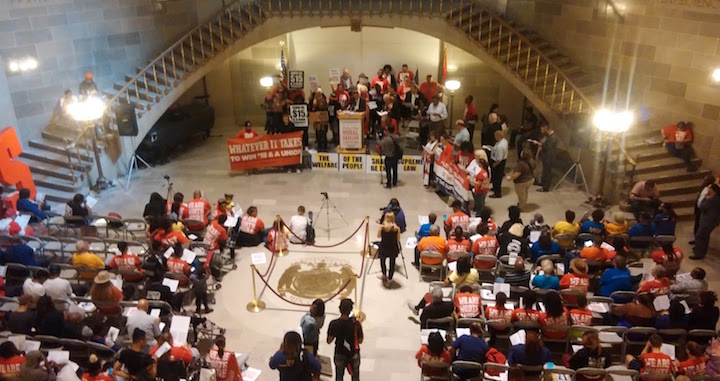“Wait, are we going to a church?”
The young woman’s tone and facial expressions clearly indicted shock and disgust. A few moments earlier, she excitedly shouted slogans into a bullhorn for the marching crowd to repeat. Apparently so surprised at the crowd’s arrival at First Baptist Church in Jefferson City on Monday, she didn’t even think to let go of the button as she blurted out her question.
Not too many people heard it since she didn’t yell and since she turned her head slightly away to ask the person next to her. But that remark still tumbled out of the bullhorn. Standing just a few people away, I couldn’t help but chuckle.
“Wait, are we going to a church?”
A couple of hours earlier, the woman arrived on a bus with her young daughter. She and a few hundred other low-wage workers came on buses from across the state to participate in a march to the Missouri Capitol. A couple dozen clergy joined the low-wage workers in pushing for a living wage, Medicaid expansion, and protection of voting rights. The clergy gathered in the church’s sanctuary for a planning meeting before heading out to the sidewalk as the buses arrived. The woman with the bullhorn must not have noticed the sign as she walked off the bus next to the church.
The group then marched the couple of blocks to the Capitol and held a rally in the rotunda. Clergy and low-wage workers spoke as the crowd cheered and waved signs. A responsive reading during the rally included several quotations from religious texts.
“Doom to you who legislate evil, who make laws that make misery for the poor, that rob my destitute people of dignity, exploiting defenseless widows, taking advantage of homeless children” (Isaiah 10:1-2).
Similar groups held rallies that same day at about 30 state capitols across the country as part of a “Moral Day of Action” effort started by Reverend William Barber in North Carolina. After the rally in the rotunda, our group marched back to the Baptist church, where people could enjoy some lunch before hopping on their bus. The woman with the bullhorn discovered her lunch joint just as we got to the door.
I’m not optimistic the event did anything to move state legislators. While it would be nice to advance more moral legislation (and kill more immoral bills), there are powerful lobbies and interests standing in opposition to the goals of this “Moral Day of Action.”
But I suspect the effort had a bigger impact on those who participated. In particular, I wonder about that young woman hoping to better provide for her daughter. She clearly doesn’t think highly of churches and likely hadn’t been to a church recently. But after eating lunch in a church and seeing clergy fighting not for themselves but for her, perhaps her reaction will be a little different the next time she passes a church. I don’t know her story, but perhaps now she’ll realize at least one church cares about her.
Some Christians dismiss social justice work like this “Moral Day of Action” as distracting us from our spiritual mission of sharing Jesus. I don’t buy such arguments because we can’t strip away the inherent political implications of the gospel teachings (as I’ve argued in my two most recent books). But a second reason we should reject efforts to over-spiritualize our faith is that working for justice can be a powerful witness to those we join hands with in our advocacy. Until they know we truly care about their lives, many won’t care about our teachings.

